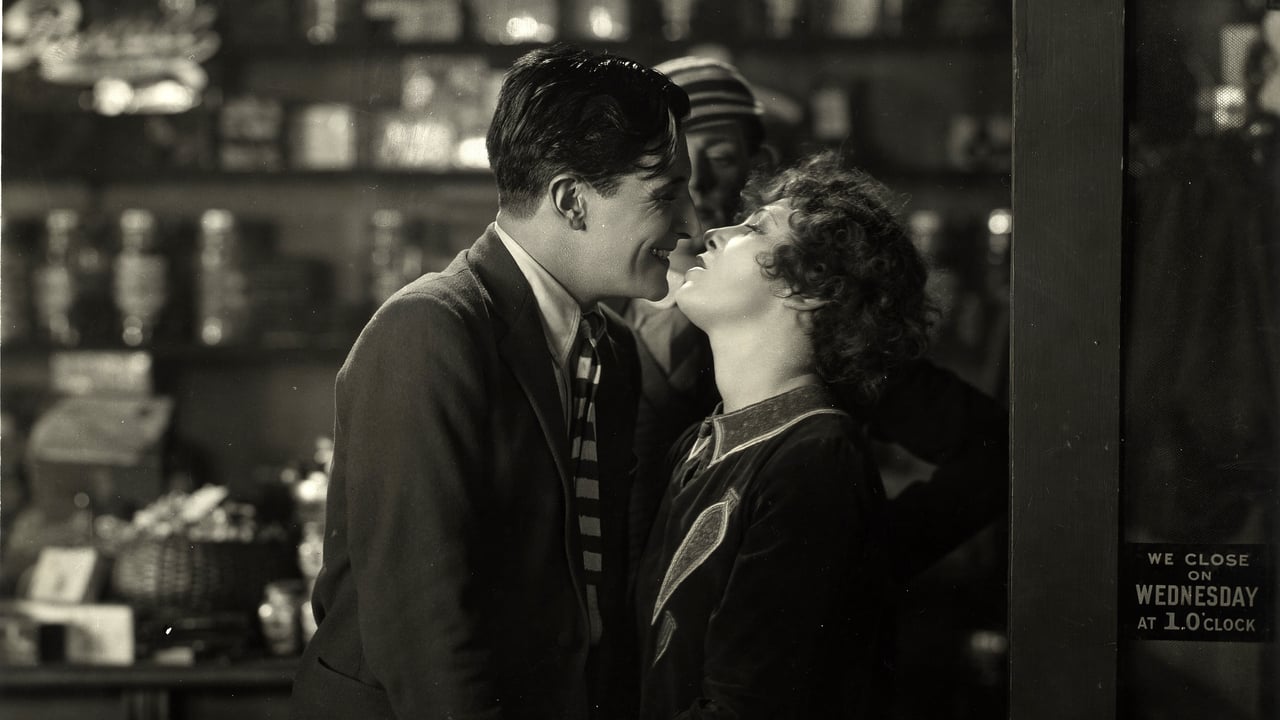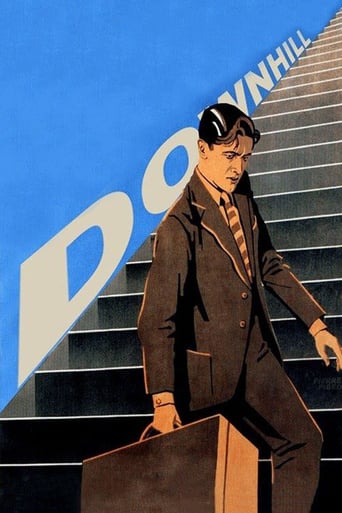NekoHomey
Purely Joyful Movie!
Glucedee
It's hard to see any effort in the film. There's no comedy to speak of, no real drama and, worst of all.
Lollivan
It's the kind of movie you'll want to see a second time with someone who hasn't seen it yet, to remember what it was like to watch it for the first time.
Haven Kaycee
It is encouraging that the film ends so strongly.Otherwise, it wouldn't have been a particularly memorable film
kkonrad-29861
'Downhill' is visually inventive and astonishing, but the story is nothing more than simple flat melodrama. Script is based on the play "Down Hill" written by Constance Collier and the film's star Ivor Novello. Roddy Berwick (Ivor Novello) and Tim Wakely (Robin Irvine) are best buddies attending expensive private school. Soon after both boys spend an evening with waitress (Annette Benson), she comes forward and says she's pregnant. She accuses Roddy, who comes from the rich family, being the father, while the real one is Tim. Roddy promises to keep his mouth to protect Tim, who might lose his scholarship. Roddy gets expelled from school, and thrown out at home by his father. Roddy falls deeper and deeper after being used by different people. Hitchcock fantastically depicts Roddy's descent after each dramatic episode with showing Novello's character going down on stairs, on escalators and with elevator.Not the Hitchcock's best movie - directing is marvelous, but the story is just too simple and predictable. On the other hand, it is very easy to care about the main character and despise the cruel people who but other persons through unfair grind (even when things happen thanks to Roddy's own naivety). P.S. At that time (in August, 2018) the film's theme is still relative.
JohnHowardReid
Producer: Michael Balcon. A Gainsborough Production. U.S. release through Sono Art-World Wide (cut to 74 minutes). No recorded New York opening. U.K. release through Wardour Films. 80 minutes U.S. release title: WHEN BOYS LEAVE HOME.SYNOPSIS: Slatternly shop-girl alleges one of two college boys sexually assaulted her, when in actual fact she encouraged both of them.NOTES: The American version was considerably censored. The allegation of sexual assault was changed to theft (which makes no sense whatever. The reaction of the players and the vicious tirade launched by Miss Benson clearly indicate that a far more serious charge was involved).COMMENT: Although it meanders to a foregone yet disappointing conclusion, this is a most engrossing movie for three-quarters of its length. The opening scenes with that delightfully vicious floosie, Annette Benson, and the clerically coddled Robert Irvine, plus the middle episode in which our hero encounters spendthrift musical comedy star, Isabel Jeans, and her faithful yet otherwise comically rotten-to-the-core lover, Ian Hunter, come over as especially striking, despite the fact that Novello is obviously far too old for a college boy and his acting (particularly in comparison with the other players) overwrought. These scenes are also full of delightful Hitchcock touches, including a bit when our hero surreptitiously pockets the heroine's purse (which it turns out is a joke on the audience), rides a lonely Down escalator to the Underground, and gets drenched on top of a double-decker bus. Mr. Hunter does extremely well in a most difficult role. His Archie is a comic character, yet he's an object of derision (except oddly from Miss Jeans) and from an audience point-of-view, totally unsympathetic. Under Hitch's inspired direction, Hunter manages to juggle hisses and comic capers with amazing dexterity. Easily the best performance of his entire career!
cstotlar-1
If I have to see another character go downstairs, I swear I'll watch the film in reverse! The plot is quite basic - nothing really new: chump plus a couple of manipulative floozies equal his downward spiral. Hitchcock wisely didn't work consciously with symbolism for most of his career and this one makes me happy he didn't! There are a few good scenes here. The characters in the cab photographed from the outside during a rain worked quite well. The super-impositions were very well done and the collage of London with its usual turmoil in the streets made its point of "business as usual" effectively. There was some rather heavy over-acting by Novello near the end that can be painful to watch. The depiction of Paris seemed as French as the English music hall. Hitchcock was learning to fly with this but as of its release, he hadn't earned his wings yet.Curtis Stotlar
Andrew Nixon
My copy of this movie is truly silence with no musical score. Whenever I watch a movie that is completely silent, initially I find it a little hard. But when the film is well made, as this one is, it doesn't take long to adjust and focus on the story as you are drawn into it. I feel Hitchcock was a master of the silent film genre with his ability to tell such a deep story with very few intertitles. Relying instead on the expressions of the actors and written notes and signs in the movie, without having to cut away to an intertitle, which allows the film to flow more fluidly instead of constant cutting between the live action and the title cards. Ivor Novello in the lead role of Roddy and in his prior work with Hitchcock in The Lodger really impressed me with his talent of conveying his feelings strictly through facial expressions and acting without the use of sound. Hitch is also good at using subtle exaggeration and focus on action to help take the place of the sound in his silent films. The story is that of a young man in school who is falsely accused of theft by a lady that he had danced with and he is willing to take the blame for a friend of his and is expelled from school. This leads to the downhill spiral of his life as leaves home after his father calls him a "LIAR!". Things get worse from there as ends up working as a gigolo in Paris, getting in fights, losing a large sum of money, and eventually hitting bottom.In this film we really begin seeing a lot of Hitchcock's visual style that he is so famous for. He has some really good use of fades and graphic matches between scenes. Two of my favorite where the fading out on the pocket watch and into a large clock, and the other being the scene where he fades out on a photograph and then back in on the real person. I really enjoyed the symbolic shot of Roddy heading down the escalator, showing us that is in heading downhill in his life. And my favorite "Hitch" shot in this movie was the point-of-view shot when the lady was leaning back in her chair and it cuts to Roddy walking into the room and we see him upside down on the screen. I also thought Hitchcock did a great job of portraying Roddy's seasickness towards the end of the film. I really enjoy seeing Hitchcock's style developing in his early silent films, that will become so prominent in his later, more famous movies. I also really appreciate Hitch's working in comedic scenes into his serious movies. My favorite humorous scene in this movie is the peashooter scene early in the film.Without giving too much away, I would have liked to see a more typical Hitchcock ending to this film. *** (out of 4 stars)

